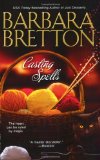 The Scorpio Races
The Scorpio Races
by Maggie Stiefvater
Scholastic Press, New York, 2011. 409 pages.
Starred Review
I wasn’t sure I would like this book when I read the cover flap, but ended up completely entranced. All my childhood love of The Black Stallion books was aroused. I started it on the way to KidLitCon, and was awfully annoyed when the plane landed and I had to stop. The second night (when I didn’t have a roommate), I kept reading until I finished, because sleep could wait!
Now, I haven’t read any of Maggie Stiefvater’s other books. I’ve pretty much had my fill of werewolf or vampire books, so I didn’t even try them. But this one is about horses — bloodthirsty water horses.
I thought the author had invented a completely new creature, but I learned in the afterword that there is a strong tradition of Manx and Irish and Scottish dangerous water horses. Of course, Maggie Stiefvater took the idea and made it her own. This is no fairy tale retelling, but an intriguing story with mythic elements.
The book begins with a Prologue set nine years earlier. The heading says we’re hearing from Sean, who we soon learn is 9 years old. Here’s how it begins:
“It is the first day of November and so, today, someone will die.
“Even under the brightest sun, the frigid autumn sea is all the colors of the night: dark blue and black and brown. I watch the ever-changing patterns in the sand as it’s pummeled by countless hooves.
“They run the horses on the beach, a pale road between the black water and the chalk cliffs. It is never safe, but it’s never so dangerous as today, race day.”
As Sean watches his father mount the red stallion, he hopes the capall will remember what Sean whispered in his ear: Do not eat my father.
“I am watching the race from the cliffs when a gray uisce horse seizes my father by his arm and then his chest.
“For one moment, the waves do not attack the shore and the gulls above us do not flap and the gritty air in my lungs doesn’t escape.
“Then the gray water horse tears my father from his uneasy place on the back of the red stallion.
“The gray cannot keep its ragged grip on my father’s chest, and so my father falls to the sand, already ruined before the hooves get to him. He was in second place, so it takes a long minute before the rest of the horses have passed over the top of his body and I can see it again. By then, he is a long, black and scarlet smear half-submerged in the frothy tide. The red stallion circles, halfway to a hungry creature of the sea, but he does as I asked: He does not eat the thing that was my father. Instead, the stallion climbs back into the water. Nothing is as red as the sea that day.”
Then the book begins, nine years later, from the perspective of our other protagonist, Kate “Puck” Connelly. Her parents were also killed by water horses, but not because they were racing. Last Fall, they were simply going for a ride in their boat offshore the island, when a water horse attacked and killed them. Now Puck’s older brother, Gabe, goes to work at the Hotel, and Puck keeps things going at home for him and their younger brother, Finn.
Puck and Finn are going into town along the beach with Puck’s beloved ordinary horse Dove when they see the first water horse of the year come onto the land.
“Finn flinches as the horse gallops down the beach toward us, and I lay a hand on his elbow, though my own heart is thumping in my ears.
“‘Don’t move,’ I whisper. ‘Don’t-move-don’t-move-don’t-move.’
“I cling to what we’ve been told over and over — that the water horses love a moving target; they love the chase. I make a list of reasons it won’t attack us: We’re motionless, we’re not near the water, we’re next to the Morris, and the water horses despise iron.
“Sure enough, the water horse gallops past us without pause. I can see Finn swallowing, his Adam’s apple bobbing in his skinny neck, and it’s so true, it’s so hard not to flinch until it’s leapt back into the ocean once more.
“They’re here again.
“This is what happens every fall. My parents didn’t follow the races, but I know the shape of the story nonetheless. The closer it gets to November, the more horses the sea spits out. Those islanders who mean to race in future Scorpio Races will often go out in great hunting parties to capture the fresh capaill uisce, which is always dangerous, since the horses are hungry and still sea-mad. And once the new horses emerge, it’s a signal to those who are racing in the current year’s races to begin training the horses they caught the years before — horses that have been comparatively docile until the smell of the fall sea begins to call to the magic inside them.
“During the month of October, until the first of November, the island becomes a map of safe areas and unsafe areas, because unless you’re one of the riders, you don’t want to be around when a capall uisce goes crazy. Our parents tried hard to shield us from the realities of the uisce horses, but it was impossible to avoid it. Friends would miss school because an uisce horse had killed their dog overnight. Dad would have to drive around a ruined carcass on the way to Skarmouth, evidence of where a water horse and a land horse had gotten into a fight. The bells at St. Columba’s would ring midday for the funeral of a fisherman caught unawares on the shore.
“Finn and I don’t need to be told how dangerous the horses are. We know. We know it every day.”
Then the narration alternates back to Sean Kendrick. He’s nineteen now, and he knows the water horses better than anyone else on the island. He has won the Scorpio Races the last four years, riding on Coll, the red stallion his father rode the day he died. But Sean isn’t racing on his own name. He works for Mr. Malvern, the richest man on the island. He wants nothing so much as to own Coll for himself, but Malvern isn’t selling.
Then Puck’s brother Gabe tells her he’s leaving the island to find work. Puck will do anything to keep him here, for any length of time, so she decides to enter the race this year.
But the island men don’t want a woman in the races. They say it’s bad luck, that she doesn’t belong. But Puck has to win. That’s the only way she can save their home, on which Malvern says he’s going to foreclose.
To add to Sean’s difficulties, Malvern’s son Mutt is jealous. Sean has always told Malvern which horse is the safest, so Mutt can ride that one. But now Mutt wants to win, even if it takes riding a horse that’s more than he can handle.
We quickly get drawn into these characters’ lives. They both love the island and the island’s traditions. They both love their horses. And they both really need to win.
Meanwhile, there’s a long tradition of how the training is done in the weeks leading up to the race, and Maggie Stiefvater has the reader mesmerized as Puck and Sean go through those weeks, Puck facing the hostility of the whole town, and Sean facing Mutt Malvern’s hatred and Malvern’s refusal to let him buy Coll. Along the way, they both are in life-or-death danger over and over again.
This book is brilliant. As I said, all my horse-book-loving little girl passions were aroused! But it had more than that. These horses were faster and far more deadly than ordinary horses, so the stakes were much higher. The author also worked in a realistic scenario of a small island totally dependent on the tourism surrounding its annual race, with young people leaving the island for the mainland. Like The Black Stallion, we’ve got a young man who is the only one who can ride a wild stallion, and maybe the horse loves him back, though wild with everyone else. And we’ve got a girl willing to risk everything to stay on the island she loves. No surprise, there’s romance between Sean and Puck, and it’s beautifully, delicately done. As the end approaches, we definitely want both of them to win the race, with so much at stake.
The one little thing I wasn’t crazy about was the character of Mutt Malvern. In general, I don’t like books to have a stereotypical bully. But Maggie Stiefvater made the situation seem quite realistic and we could pretty easily believe Mutt would act the way he did. She did keep him just the right side of stereotypical. And the interaction between Mutt and Sean definitely ratcheted up the tension.
Yes, I confess, even though I never had a horse, I was a stereotypical horse-loving little girl through books. And this book was like those childhood reads, only more so. I have a feeling I will be rereading this book many times. It is that good.
Buy from Amazon.com
Find this review on Sonderbooks at: www.sonderbooks.com/Teens/scorpio_races.html
Disclosure: I am an Amazon Affiliate, and will earn a small percentage if you order a book on Amazon after clicking through from my site.
Source: This review is based on a library book from the Fairfax County Public Library.









